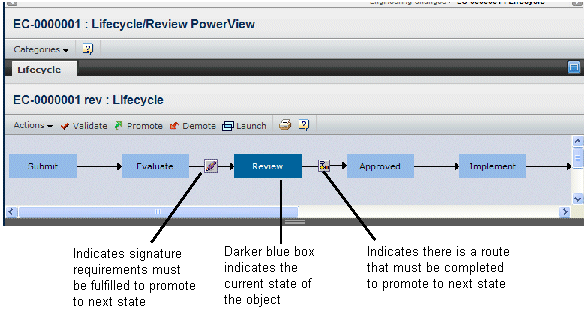Lifecycle Page | ||
| ||
The Lifecycle page includes:
- signature requirements
- branches (does not indicate the branch taken to arrive at a state)
- any blocking routes
- the current state
Users can use the page to view and apply signatures, promote and demote the object, and view blocking routes.

ENOVIA Business Process Services installs a command object called AEFLifecycle that calls the lifecycle page and is configured to be a category in a navigation tree.
You can pass these parameters to emxLifecycle.jsp.
| Parameter | Description | Accepted Input Values |
|---|---|---|
actionMenuName |
The name of the menu |
Name of any menu object that represents a menu. The framework installs with a command object called AEFLifecycleMenu that includes a Promote and Demote link. |
header |
The title for the page. |
Text string or string resource, such as: Lifecycle emxFramework.Lifecycle.LifeCyclePageHeading |
*Required Setting |
||
When configured as part of a navigation tree for an object (implemened in the UI as the Categories menu), the system automatically passes the objectID for the object. From the object ID, the page gets the object's type and policy. From the policy, it retrieves the states, signatures, and branches. For policies with branches, when a user clicks Promote, the system promotes to the state for which signature requirements have been met. When naming signatures for branched states, do not use the prefix "GoTo" or the signature box on the Lifecycle page will be hidden, preventing users from being able to apply signatures.